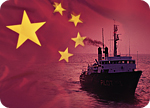 Chinese pharmaceutical manufacturers caught using 'gutter oil' to make antibiotics
Chinese pharmaceutical manufacturers caught using 'gutter oil' to make antibiotics
Sunday, September 09, 2012 by: J. D. HeyesAs China continues to rise as the new Asian powerhouse, there has been a steady stream of reports which have detailed the country's staggering lack of standards when it comes to producing manufactured goods, so it was only mildly shocking to learn that authorities there are now looking at charges that some of the country's pharmaceutical companies are using disgusting "gutter oil" to make antibiotics.
For the uninformed (which included me before I came across this story), gutter oil is essentially reprocessed kitchen waste dredged from restaurant drains.
While you're getting a mental picture, read on: Chinese authorities are responding to reports that drug makers may have used it to manufacture antibiotics instead of the more expensive (and, most likely, much cleaner) soybean oil.
What's more, the gutter oil has apparently been at the heart of several food-safety scandals in China in recent months, the BBC reported, quoting Chinese officials - though in typical fashion, the government was secretive, saying it would release its findings soon without providing additional details.
Disgusting gutter oil prevalent throughout Chinese manufacturing
Disgust factor aside, it wasn't clear whether the gutter-oiled antibiotics posed any risk to public health. But nonetheless, the incident highlights how thoroughly Beijing, while remaining socialistic and authoritarian, has nonetheless embraced quasi-capitalist principles of cutting corners to control costs and boost profits.
The British news giant reported that repeated food-contamination scandals, with gutter oilbeing only the most recent of them, have roiled China's massive population and have caused no small amount of alarm and mistrust.
In April, for instance, state-run media outlets reported on how authorities had begun cracking down on underground workshops that utilized decomposing animal fat and organs to produce more of the gutteroil, which apparently can be "manufactured" from a number of equally disgusting sources.
Police then said most of that oil had been sold to oil manufacturers for food production, no less, and for making hotspot soup - a local cuisine - in restaurants.
A year ago, meanwhile, Chinese police arrested 32 people in connection with an operation to prevent the sale of gutter oil as cooking oil. In that case, more than 100 tons of oil was produced by six underground factories; authorities seized the massive amount in raids that stretched across 14 provinces.
And in 2008, at least six infants died and a staggering 300,000 more were made ill after drinking baby formula that had been tainted with the chemical melamine.
'Made in China' is a detriment here in the U.S. as well
An earlier report by NaturalNews documented how the food chain "Whole Foods," which built its reputation in large part on selling organic food, provided details about how many of that company's signature products came not from U.S. farms but from China.
At more than 175 stores nationwide, Whole Foods promotes a homegrown concept, but many of the supermarket chain's goods are marked "Product of China."
What's wrong with that? Well; for one, importing food from China is anathema to Whole Foods' concept of "locally grown" and "organic." For another, China's agricultural development regulations are nowhere near as stringent as they are in the U.S.
And finally, despite Whole Foods' assurances to the contrary, how is a consumer - or the company, for that matter - to know whether all of its Chinese-grown products are indeed pesticide-free?
It should be noted that food sold in the U.S. has to first be approved by the U.S. Department of Agriculture before it can display the "organic" label, by regulation. That not only ensures it's safe but that it was grown in the manner advertised.
No comments:
Post a Comment